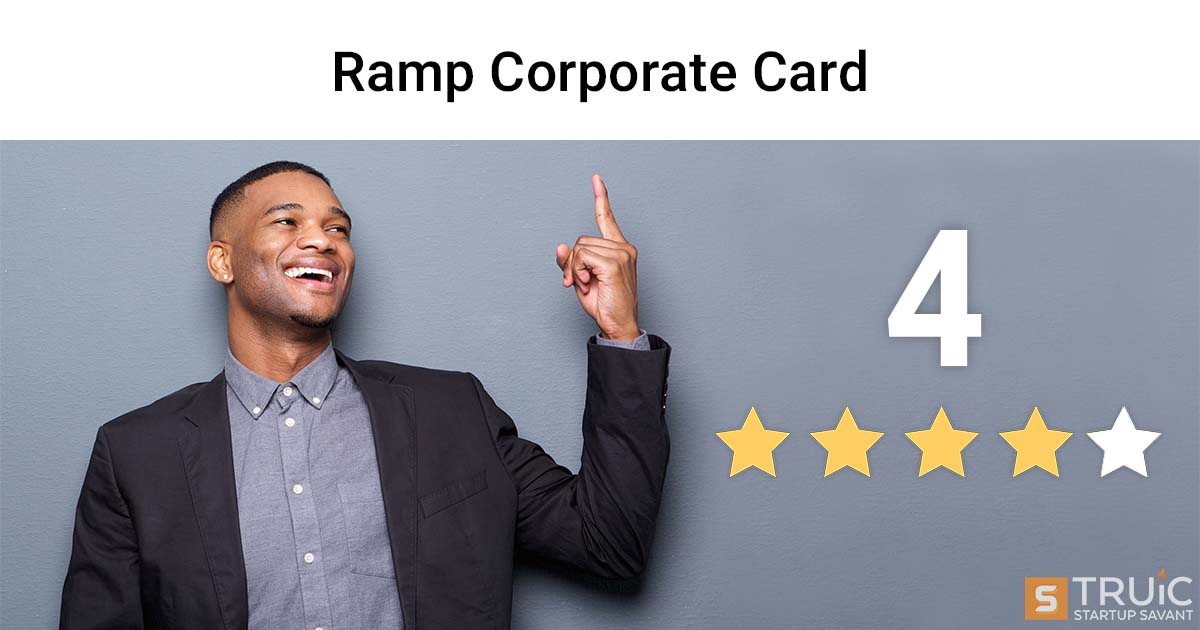Ramp Corporate Card Review 2024
Is It the Best Credit Card for Your Startup?

Last Updated: By TRUiC Team
The Ramp Card is a corporate credit card that’s available to formal businesses, such as corporations, limited liability companies (LLCs), and limited partnerships (LPs). The card offers a bunch of benefits like no annual fee, 1.5% cash back, and access to an advanced automated finance platform that may be integrated with business software.
The Ramp Card is meant for young companies with the potential to scale, and so eligibility is determined by the financial strength of the business. Business owners don’t have to provide personal guarantees, meaning they won’t be personally liable for any business debts, and their personal creditworthiness won't be taken into account. Even if an owner has poor credit, his business may be eligible if it’s doing well.
Ramp’s mission — that users will save money — is a unique one in the corporate card space, with the company claiming that most of its customers have saved $100,000 or more in their first year.
So, is the Ramp Corporate Card right for you? Keep reading to find out!
Recommended: Read our guide to the Best Credit Cards for Startups.
Ramp Corporate Card Eligibility Requirements
The Ramp Corporate Credit Card is designed for businesses that are formally created, such as limited partnerships, limited liability companies (LLCs), and corporations, both for-profit and nonprofit. This means that sole proprietorships and partnerships that generally make no legal distinction between owners and businesses aren't eligible.
In addition, Ramp requires its potential client companies to have most of their operations and corporate spending in the US, although the company says it will support international transactions and waive the related transaction fees.
To be eligible, a business should have the following:
- Strong revenue
- Current expenses exceeding $10,000/month on corporate credit cards
- A bank balance of at least $75,000
An application for the Ramp Corporate Card should include the business formation documents, an estimate of the current monthly expense on business credit cards, as well as the EIN of the business and the personal addresses and the last four digits of the owners’ SSNs.
Pros and Cons of Ramp Corporate Card
Pros of Ramp Corporate Card
- No annual fees
- No fees on foreign transactions
- Personal guarantees from owners aren't required
- Approval decision isn’t affected by owners’ creditworthiness
- Can be integrated with a range of popular business software
- Tools to manage expenses and control costs
Cons of Ramp Corporate Card
- Balance must be paid off completely each month.
- Unincorporated businesses such as general partnerships and sole traders aren’t eligible
- No incentives to sign up
- Requires high cash reserves of at least $75k
- No Android App
Ramp Corporate Card Fees and Features
Rather than being a “credit card,” the Ramp Corporate Card is a “charge card,” which means that any outstanding balance must be paid in full every month. The card will be linked to a business bank account so that payment is made automatically.
The card pays 1.5% cash back on all purchases. These cash back rewards are redeemed as statement credits, and there is no limit.
Cardholders also get access to an advanced digital platform that allows integration to third-party accounting, collaboration and expense reporting software, made available at discounted prices. These include applications such as NetSuite, Pulley, QuickBooks, Rippling, Sage Intacct, Secureframe, Slack, WeWork, and Xero.
The card also makes “partner perks” available. Account holders will receive discounts from Amazon Web Services (AWS), Google Ads, and other “partners” worth $175,000 combined.
The card has no annual fee and is available without providing either a personal guarantee or credit check. Eligibility and credit limit are determined by business revenue, cash flow, and bank balance. The business must currently be spending more than $10,000 per month on corporate cards and should have at least $75,000 in a US business bank account. Ramp advertises that its credit limits are 10–20x higher than its competitors.
Rewards and Benefits
- 1.5% cash back reward on every purchase, with no limit
- No category restrictions on purchases to qualify for cash back
- A $175,000+ bundle of special offers from third-party vendors
Interest Rates
Ramp is a charge card, so the balance must be paid off in full every month. Since the card doesn't extend credit, there are no interest charges. Ramp earns revenue from transaction fees.
Fees
- Merchant Fees: 1.15%–2.40%
- No annual fees
- No late fees
- No foreign transaction fees
The Ramp Corporate Card has no annual fee. It does, however, have transaction fees. When you use your Ramp card, the vendor pays merchant fees, also known as interchange fees. These are split between Visa (Ramp’s card network), the vendor’s bank, and Ramp.
How Does Ramp Corporate Card Compare?
Qualifying for the Ramp card requires a couple of good financial metrics, as well as satisfying some non-financial conditions. To qualify for Ramp, your business must:
- Be registered in the United States;
- Be a corporation (profit or nonprofit), LLC, or LP;
- Have a strong stream of revenue;
- Have at least $75,000 in a US business bank account linked to your application; and
- Have most of your operations and corporate spend in the US.
To apply for a Ramp Card, you need to provide the following:
- Business’s legal and DBA names, address, and description;
- Corporate formation information, including the EIN and formation dates;
- Monthly business card spend;
- Personal address and contact information, including the last four digits of the SSN, for one corporate officer or business owner; and
- Credentials to link a bank account and any commerce sales platform account.
One corporate card that rivals the Ramp card in terms of features and benefits is the Brex card. Like the Ramp card, the Brex card is a charge card, which means that balances must be paid in full every month. Another similarity is that neither card requires a personal guarantee or runs a credit check to determine suitability. However, their rewards program and eligibility requirements differ.
Both cards require high cash reserves — Ramp $75,000 and Brex $100,000 — but Brex will waive the reserve requirement for applicants backed by professional investors.
While Ramp’s reward program offers unlimited cash back of 1.5% on all purchases, Brex’s rewards program offers points instead. For every $1 spent, a business may earn up to eight points instead of cash back.
Ramp Corporate Card
$0 Annual Fee
Unique feature: Spend management tools help cut costs.
Best for: New, quickly-growing startups with a shorter credit history.
Brex
$0 Annual Fee
Unique feature: Card comes with Brex Cash — a cash management tool that operates like a bank account.
Best for: Fast-growing startups.
Final Thoughts on Ramp Corporate Card
The Ramp Corporate Card is one with a novel objective in the card universe: cutting customers’ costs. Despite earning revenue from merchant fees, Ramp says it wants customers to spend less. It claims the proof is in the pudding, with some 98% of customers enjoying $100,000 or more in savings.
Ramp’s associated AI platform helps reduce the exorbitant amount of time spent in keeping track of receipts and submitting them with expense reports. Every time the card is used, a client’s employees can submit receipts in some electronic form. They may, for example, take a photo of the receipt with their mobile phone and enter the image in the system.
Ramp combines OCR, data-dependent contextual data, and transaction data to match receipts to charges in real time with no need for intervention.
Ramp is ideal for startups since qualifying for its facilities doesn't depend on having a long credit history. It’s even better suited for new businesses that are growing quickly because rising revenues and large cash balances are the main qualifying factors.
Frequently Asked Questions
What is the Ramp Corporate Card?
The Ramp Corporate Card is a charge card designed for new, fast-growing businesses. To qualify for it, a business must be a corporation, an LLC, or an LP. The card has no annual fee, and offers unlimited 1.5% cash back, plus access to AI-powered spend control tools and direct integration capability with a range of business software.
Does Ramp require any personal guarantees?
Ramp requires no personal guarantees from business owners. Ramp considers only the prospects of the business in determining eligibility.
Does the Ramp card report to business credit bureaus?
Yes. Ramp reports to the major business credit reporting agencies Dun & Bradstreet, Experian Business, and Equifax Small Business. Using the Ramp Card will allow your business to build credit.
How does Ramp determine your credit limit?
Ramp determines credit limits based on the balance of the bank account associated with the card.
How does Ramp save users time?
Ramp cuts the time spent compiling and submitting expense reports manually. Receipts are collected at the time of purchase. They can be submitted by SMS or email. Ramp then automatically matches each receipt to the corresponding transaction.
How does Ramp make money?
Ramp earns its revenue by receiving part of the interchange fees charged to merchants when the card is used. Interchange or merchant fees are the fees charged by the card networks, which they share with card issuers (mostly banks) and payment processors, such as Ramp.
About the Author



